Petrol stations, known as garages, early-to-mid 20th century UK
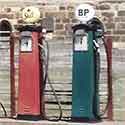
In the 1940s and 1950s, petrol was the fuel for cars and lorries, and it was sold from buildings known as garages - not petrol stations or filling stations. This page starts by explaining the name and goes on to describe the old style petrol pumps with their garage attendants, there being no self-service. It describes how petrol was sold, this being before the country went decimal, and how and when petrol was rationed.
____
By the webmaster based on her early recollections, discussions with older people and research in museums
Why petrol stations were called garages
Garages did more than just sell petrol. They invariable employed mechanics who could make repairs to cars. In those days, car engines were not as complex as they are today, so it was not unreasonable for mechanics to be adequately familiar with the engine of any make of car.
Garage buildings
Garages that I saw at the time were not normally custom built. They were in buildings built for other purposes and adapted, as shown in the photos.
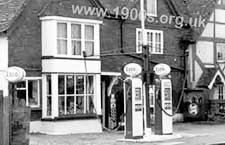
Photo courtesy of Send and Ripley History Society
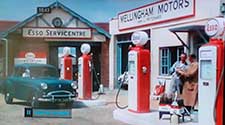
Typical old urban petrol stations (then known as a 'garages').
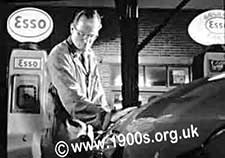
Garage attendant filling a car. Screen shot from an old film
In rural areas, though, where space was not at a premium, there were garages that might be called custom-built, although they were more like elaborate sheds.
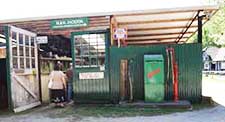
A rural garage which doubled as a car mechanic's workshop. Photographed in
Tylford Rural Life Centre
Filling up with petrol: garage attendants
For much of my life and earlier, it was unheard of to fill one's car oneself.
All garages had one or more attendant who kept a look-out for customers and came out to them to fill their cars. The driver paid through the window; change was brought back to him - or very occasionally, her; and the customer never had to get out of the car.
Garage attendants always seemed to wear dirty overalls, so perhaps filling cars was dirtier in those days or perhaps the attendants also doubled as mechanics. Either way, customers kept their hands and clothes clean.
Changing prices of petrol
The spiralling costs of petrol has been a feature of driving during my lifetime and I wish that I had kept a record. What I can remember from around the end of the 1960s was a student announcing to a group, "Do you realise that petrol is set to go up to 50p per gallon!?" Everyone was amazed and incredulous. If you have any recollections from the early days, please get in touch.
Petrol was rationed on and off, and there is a page about it in the general rationing and shortages section. It also shows a range of petrol coupons.
Old petrol pumps
The design of petrol pumps changed over the years. The following pictures are presented in what I believe may be date order - unless you know different. However, almost certainly designs were phased in and out.
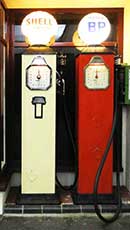
These are the type that I remember from the 1940s and 50s.
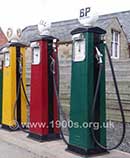
Petrol pumps photographed in the Black Country Museum
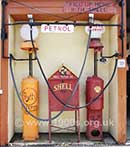
Petrol pumps photographed in Amberley Museum
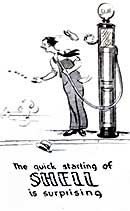
Petrol advert, photographed in Brooklands Museum
| sources | webmaster | contact |
Text and images are copyright
If you can add anything to this page or provide a photo, please contact me.



